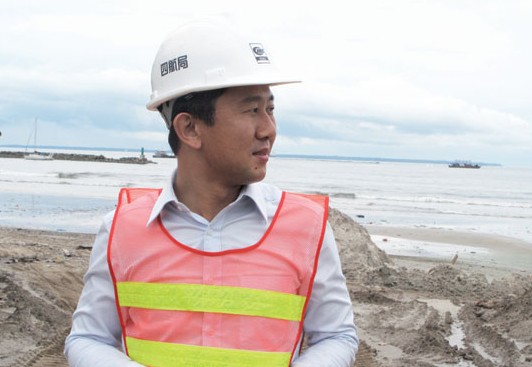

China Harbor Engineering Co is constructing the first phase of a new waterfront in Libreville. Photos by Wang Chao / China Daily
Chinese companies face challenging times in West African nation of Gabon
Taking Libreville's main coastal road with palm trees swaying in the Atlantic breeze, one could easily imagine it being an upmarket French resort. Gabon, of which it is the capital, has one of the highest standards of living in sub-Saharan Africa. Its gross national income per capita of $14,090 - putting it firmly in the middle-income bracket - is more than 50 percent higher than that of China's $9,040, according to 2012 World Bank figures.
Neither the wealthy ambience of the capital nor the statistics give the full picture, however. Only a minority of the country's 1.5 million citizens enjoy the country's wealth with almost one-third living below the poverty line and 20 percent enduring long-term unemployment.
When you venture inland, the true development state of the country is revealed with no accessible roads and many parts of the densely forested country only accessible by air.
China has had a long association with the country. The late president Omar Bongo visited China 10 times in his 42-year rule. Zhang Dejiang, now chairman of the Standing Committee of the National People's Congress, attended his funeral in 2009.
The new president, Ali Bongo Ondimba, who was elected after his father's death, was educated at the Sorbonne in France and is, however, seen as less Sinophile.
Yet, the two countries have a significant economic partnership. Despite its tiny population, Gabon was still China's 28th largest trading partner in Africa in the first nine months of last year with total trade of $745 million.
In January, the two countries resolved a dispute over future oil rights in the country.
Addax Petroleulm Corp, the biggest overseas subsidiary of Sinopec, agreed a 10-year contract to extract oil at three fields in Tsiengui, Obangue and Autour.
This will deliver to the Chinese company a significant amount of Gabon's output.
The deal ended the prospect of a potential $1 billion legal dispute over future rights in Gabon.
Zhang Yi, chief executive officer of Addax Petroleum, told China Daily in January that the new agreement proved Chinese investment was still welcome in Gabon.
"We have concluded negotiations in a mutually beneficial way. I think this is a sign that our performance has been recognized and Chinese investors have been welcomed by the Gabonese Republic," he says.
The resolution, however, was in contrast to China Machinery Corp's loss of mining rights to the Belinga iron ore deposits in the northeast of the country in December.
The company had acquired the rights in 2006 but they are now expected to go to Australian mining giant BHP Billiton, according to some reports.
Despite that loss, Chinese companies are still involved in major infrastructure projects in Gabon. China Harbor Engineering Co is currently constructing phase one of a $120 million 15-month project for a new waterfront in Libreville.
Sinohydro, the biggest Chinese company in Gabon, has just completed a $500 million hydropower station at Grande Poubara on the Ogooue River and is also engaged in road contracts of more than $1.2 billion.
The Chinese also built and part-funded the country's main football stadium, the Stade d'Angondje, which was used for the 2012 Africa Cup of Nations, as well as building the country's National Assembly and Senate buildings.
It is a country in which French interests are entrenched, however. The last of the four territories in French Equatorial Africa to become independent in 1960, there remain some 10,000 French citizens living in the former colony and some 300 French companies.
Gabon is increasingly also less reliant on Chinese funding. In December, it raised $1.5 billion through a new 10-year eurobond offering to reduce its borrowing costs and fund infrastructure development.
The cost, at 6.37 percent, is far higher than most Chinese funding, which can be as low as 2 percent over 20 years and often can be rolled over after the term.
At the Chinese embassy in the Sabliere district of Gabon, economic counselor Wu Jingchun says there seems to be a reluctance to receive financial support from China.
"We have approached the Gabon government about finance but they are not very keen to get loans from China. The Export-Import Bank of China has been in contact to offer loans. They don't appear to want loans from China," he says.
Wu, a 50-year-old urbane diplomat with spells in Cameroon and Paris behind him, says Gabon can present significant challenges for Chinese companies operating in the country.
"If you build a factory you have to import all the materials because nothing is manufactured locally. Local labor costs are also high. The minimum wage is $300 a month compared to just $60 in neighboring Cameroon. The market is also small. If you sell everyone in the country two cellphones that is only 3 million phones," he says.
Addax Petroleum confirms signing of oil drilling agreement with Gabon
2014-01-18Gabon cancels Chinese firm‘s mining licence
2013-12-22China grants Gabon over US$133 mln in loan for road project
2013-10-01China vows to boost ties with Gabon
2012-10-26Chinese military delegation visits Gabon and Senegal
2012-06-04Copyright ©1999-2018
Chinanews.com. All rights reserved.
Reproduction in whole or in part without permission is prohibited.